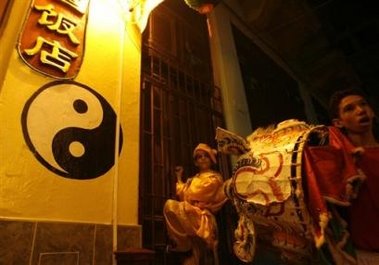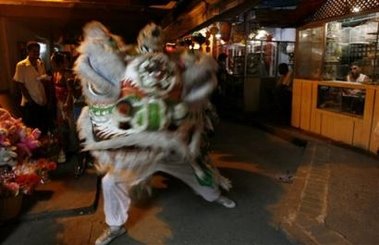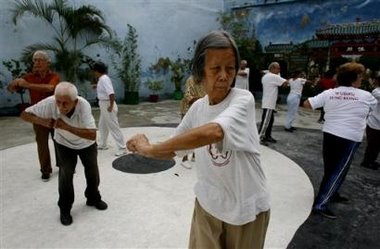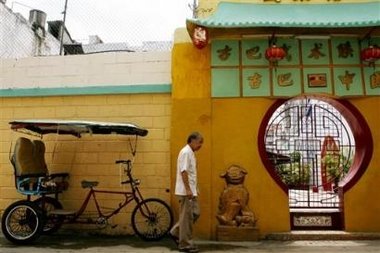By VANESSA ARRINGTON, Associated Press WriterTue May 30, 4:13 AM ET
AP Photo/Javier Galeano:




They came as young men and women, and never left.
Elderly Chinese immigrants still walk the streets of Havana's "Barrio Chino," or Chinatown, where they play mahjong and eat lunch together, practice tai chi and read magazines from their homeland.
There are just 143 natives of China currently registered in Havana — most of them men, according to Cristina Nip, a descendant who runs Chinatown's social work program. After decades on the Caribbean island, they say they feel just as Cuban as Chinese.
"Equal parts both," said 70-year-old Julio Li, whose name itself reflects the blend. "I speak Spanish, and I speak Chinese. I drink Cuban rum, and Chinese tea."
The retired Li read a Chinese-language Newsweek as he puffed away on a cigar, relaxing in a high-ceilinged room of the Min Chih Tang association. He planned to play mahjong later to prepare for a competition that is part of a festival celebrating Cuba's Chinese heritage.
Li came to Cuba with his parents when he was just 14 years old. His father sold vegetables in a Havana market — as would Li.
Many Chinese immigrants arrived on the island after fleeing communism and economic difficulties in China in the late 1940s and 1950s, building a bustling merchant and agricultural class before their chosen refuge also became communist under Fidel Castro.
Some decided to move again, heading to other large Chinese migrant communities in the United States and Latin America after Castro's 1959 revolution. Those who stayed turned their shops and businesses over to the government and got new state jobs.
"Things have really changed here — I just go with the flow," said Li, who said he stayed in Cuba because he lacked the means and the desire to leave. "I don't get involved in politics. Not Cuban politics, not Chinese politics — none of it."
Li is on the younger end of China natives in Havana, most of whom are in their 80s and 90s. Three centenarians from the community passed away last year, according to Nip, who makes house visits across Havana to keep track of those remaining. Several elderly Chinese also live in other cities on the island, though the largest concentration is in the capital.
The Chinese presence in Cuba dates to 1847, when a group of 200 immigrants from Guangdong province arrived on a Spanish ship to work on Cuba's sugarcane plantations. Tens of thousands of Chinese followed from the mid- to late-1800s as contract laborers, many working for years in virtual slavery.
After slavery was abolished in the late 19th century, the Chinese began forming an ascending class of restaurateurs, laundry shopowners and vegetable merchants. Many of them brought their entire families over from China to live with them.
Of the latest flood of immigrants who came to Cuba more than 50 years ago, many have never gone back to visit China, others just once or twice. In 2003, the Cuban and Chinese governments hosted a trip home for five of the immigrants, and plans are in the works to organize visits for about a dozen more, Nip said.
Some of those left in Cuba still pay some attention to political and economic developments in China but seem more interested in the personal news they get in letters from their relatives.
"I'm always thinking about my family over there," said Ofelia Lau Si, 85, who moved to Cuba with her husband in 1949 and is one of just 30 female natives left. "I went back to visit them once, and I was so happy."
But she also has a large family here now, complete with Cuban in-laws and grandchildren who hardly speak Chinese. "They're a bit far from the traditions," she said.
Next to Lau Si sat another China native, 80-year-old Rosa Wong, as they waited for their tai chi class to begin in an open-air Chinatown community center.
Wong's children married other Chinese, and her 20-year-old granddaughter Meyling Wong has become one of the top athletes in Havana's Wushu sport association, winning medals at competitions around the world. "My grandmother often brought me to Chinatown when I was a little girl," Meyling Wong said. "I was always fascinated by the culture here."
Angel Chiong, 81, has gone back to China several times, and still feels a strong link to his homeland. He is administrator of Kwong Wah Po, Havana's only Chinese newspaper, which is published every 15 days.
"I was born there, and that stays with you forever," he said. "But when you're as old as I am, here or there — what's the difference?"
No comments:
Post a Comment